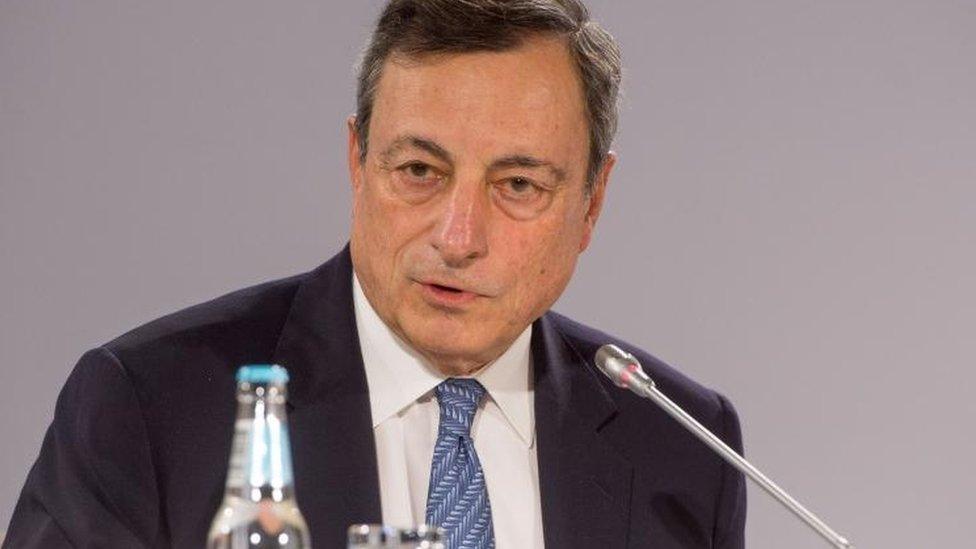ECB forecasts higher growth but keeps rates on hold
- Published

Mario Draghi said risks to eurozone growth were "broadly balanced"
The European Central Bank (ECB) has increased its forecasts for economic growth in the eurozone but kept interest rates on hold.
ECB president Mario Draghi also hinted that there was no need to cut rates further.
He told a press conference: "We are now confident that inflation will converge with our objectives."
The ECB now expects growth across the eurozone to be 1.9% in 2017 compared with its March forecast of 1.8%.
It also increased its growth projection for 2018 to 1.8% from 1.7%, and for 2019 to 1.7% from 1.6%.
Mr Draghi said: "The risks surrounding the euro area growth outlook are considered to be broadly balanced". This was a marked change from his comments in April, which described the risks to growth as "tilted to the downside".
Inflation outlook
Meanwhile the ECB has downgraded its outlook for inflation to 1.5% in 2017, from 1.7%.
It also revised its inflation outlook for the following years to 1.3% in 2018, and 1.6% in 2019 as against 1.6% and 1.7% respectively.
The ECB targets inflation of close to, but below, 2%.
Aberdeen Asset Management Senior Investment Manager Patrick O'Donnell said:"The ECB is essentially in a holding pattern, waiting for more positive inflation data to come in.
"There's no appetite to risk choking off the growth that the economy has been seeing of late. Doing nothing is probably the right decision at the moment."
Growth accelerates
Earlier on Thursday, the Eurostat statistics agency said the eurozone economy had grown at its fastest rate in a year during the January-to-March quarter.
At that rate, the 19 countries that use the euro would see growth at 2.3% this year, nearly double the rate of the US, which is on course to grow 1.2%.
Mr Draghi said the recovery was due to a pick-up in investment and corporate profitability, gains in employment and the global recovery supporting trade and euro area exports.
However, he added that growth prospects were being dampened by "a sluggish pace of implementation of structural reforms".
Quantitative easing
Mr Draghi said that the ECB would continue its stimulus programme buying bonds, adding that the "ECB will be in the market for a long time".
The ECB started buying government and corporate bonds in its quantitative easing (QE) programme in March 2015, starting at a rate of 80bn euros a month and then reducing it to 60bn euros.
Mr Draghi said it had made huge difference to lending across the eurozone: "Financing conditions remain extremely favourable, and this is because of QE. The pass-through of our monetary policy has never been so effective as it is today."
The bond buying programme is expected to top 2 trillion euros by the year end, and its current interest rates mean that banks have to pay a deposit rate of 0.4% to park their funds with the ECB.
- Published5 June 2017
- Published12 May 2017
- Published22 May 2017